
Harvard Terms and Acronyms
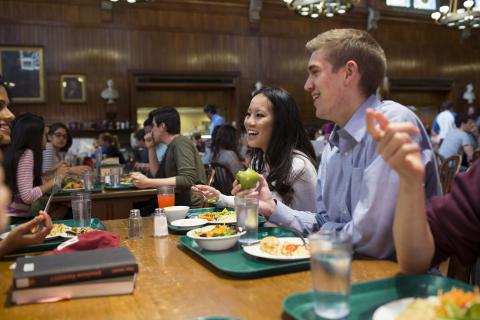
Learning the Harvard Lingo
When one first begins their journey at Harvard College, it can often feel as though students, faculty, and staff are speaking in their own unique lingo. With the many acronyms, terms, and general lingo that are specific only to the Harvard experience, new students may feel confused about locations, offices, courses, activities, or resources available to them.
If you are having trouble deciphering all of the Harvard acronyms and abbreviations, you are not alone. In the guide below, find all of the common abbreviations heard around the Yard, as well as links to any locations or resources.

Offices and Locations
Have a class being held in WJH? A professor recommends that you check out the ARC? Your friends say they are going to a virtual event organized by the SOCH?
Many offices and locations around campus are abbreviated for simplification. See below a list of acronyms for the many places around campus, with links to their respective websites and details, so you will never be wondering where you need to be next.
Offices and Locations
-
- APO: Advising Programs Office
- ARC: Academic Resource Center
- ART: American Repertory Theater
- Center for Wellness: David S. Rosenthal Center for Wellness and Health Promotion
- CGIS Knafel & South: Two buildings that make up the Center for Government and International Studies
- The Coop: The campus store and bookstore for the Harvard and MIT communities. Read more about the Coop
- DAO: Disability Access Office
- DSO: Dean of Students Office
- FAO: Financial Aid Office
- FAS: Faculty of Arts and Sciences
- FASRO/RO: Registrar's Office
- FYE: First-Year Experience
- GHHP: Global Health and Health Policy
- GSAS: Graduate School of Arts and Sciences
- GSD: Graduate School of Design
- HAA: History of Art and Architecture
- HAM: Harvard Art Museums
- HBS: Harvard Business School
- HDS: Harvard Divinity School
- Hem/Hemenway: Gymnasium on the Law School campus open to College students
- HFA: Harvard Film Archive
- HGSE: Harvard Graduate School of Education
- HIO: Harvard International Office
- HKS: John F. Kennedy School of Government
- HLS: Harvard Law School
- HMS: Harvard Medical School
- HSDM: Harvard School of Dental Medicine
- HSHS: Harvard Square Homeless Shelter
- HSPH: School of Public Health
- IOP: Institute of Politics
- MAC: Malkin Athletic Center
- MCZ: Museum of Comparative Zoology
- NW: Northwest Labs
- MCS: Mignone Center for Career Success
- OFA: Office for the Arts
- OGC: Office of the General Counsel
- OGE: Office for Gender Equity
- OIE: Office of International Education
- OUE: Office of Undergraduate Education
- PBHA: Phillips Brooks House Association
- QRAC: Quadrangle Recreational Athletic Center
- The Quad: Radcliffe Quadrangle
- SC: Science Center
- SEAS: School of Engineering and Applied Sciences
- SEC: Science and Engineering Complex
- SEO: Student Employment Office
- SOCH: Student Organization Center at Hilles
- SOCO: Student Organization Center Online
- URAF: Office of Undergraduate Research and Fellowships
- WJH: William James Hall
- Y2Y: Young Adults United to End Homelessness, Y2Y Harvard Square
- Yards: Residential neighborhoods for first-year students
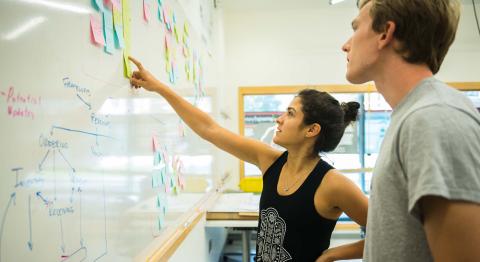
Academics
Maybe a friend recommends a course in the MCB department, and you aren't sure what MCB stands for. Maybe you receive an email from a TF, but don't know what TF means.
Many academic departments within the College are abbreviated for course registration purposes. See below a list of acronyms for some of the academic departments offered for students, as well as other academic terms such as a concentration, section, and more.
Academics
-
- Ad Board: Harvard College Administrative Board
- AFAM: African and African American Studies
- AFVS: Art, Film, and Visual Studies
- CA: A course assistant, typically an undergraduate student, provides various kinds of support for a course. Course assistants have usually taken the course in the past and performed well in it. They may assist a course head directly or provide additional support for a TF or TA.
- Citation: Refers to language programs that students can complete for recognition on their transcript
- Concentration: An undergraduate field of study, or major. View the full list of concentrations on the College site.
- Crimson Cart: Used to enroll in and keep track of courses on my.harvard.edu
- CS: Computer Science
- EAS: East Asian Studies
- EMR: Ethnicity, Migration, Rights
- EPS: Earth and Planetary Science
- ESE: Environmental Science and Engineering
- ESPP: Environmental Science and Public Policy
- Harvard Library: Access to all library locations, resources, and catalogs
- HDRB: Human Developmental and Regenerative Biology
- HEB: Human Evolutionary Biology
- Hist & Lit: History and Literature
- IB: Integrative Biology
- MBB: Mind Brain Behavior
- MCB: Molecular and Cellular Biology
- OEB: Organismic and Evolutionary Biology
- Office Hours: Office hours are a time when course instructors make themselves available to students to answer questions about course material. The format for office hours varies across courses and is usually described in the syllabus.
- Pset or problem set: A set of problems assigned to students (usually weekly) that requires them to apply concepts they are learning in class. Students will often refer to STEM classes as “pset classes,” since completing psets is one of the most important parts of the course.
- Reading Period: A designated time for students to study, synthesize material, review content learned throughout the semester, and prepare for the upcoming exam period. Read more about Reading Period.
- RL&L: Romance Languages and Literatures
- SEAS (“seas”): School of Engineering and Applied Sciences.
- Section: A small-group discussion section for a course
- Secondary: A secondary field of study, or minor. Read more about secondary fields.
- STEM: Refers to courses and concentrations at Harvard that focus on science, technology, engineering, and mathematics.
- TF/TA: A teaching fellow or teaching assistant is a person, typically a graduate student, who teaches at Harvard but is not on the faculty. Usually, TFs and TAs provide support for course heads and run sections and labs to supplement lecture. Your TF or TA in a course is often your main point of contact in that course. Occasionally, TFs and TAs teach their own courses, but these are almost always seminars and are usually for upper-level students within a concentration.
- TDM: Theater, Dance, and Media
- Tutorial: A small seminar or individual course within a field of concentration, may be required for a concentration's requirements or to write a senior thesis.
- WGS: Studies of Women, Gender, and Sexuality
- Wintersession: Optional programs offered during the last week of Winter Break. Also known as J-term (January term). Read more about Wintersession.

Student Organizations and Extracurriculars
The beginning of each semester is often overwhelmed with opportunities and invitations from student organizations and extracurriculars. If you are wondering what that email from the CEB means, or you aren't sure what WHRB stands for, see below for a list of acronyms related to student organizations and extracurriculars.
Organizations and Extracurriculars
-
- CEB: College Events Board
- Comp: A process of applying to an organization or extracurricular
- FYSC: First-Year Social Committee
- HOC: Harvard Outing Club
- Hoco: House Committee
- HSA: Harvard Student Agencies
- HUA: Harvard Undergraduate Association
- HVC: Harvard Varsity Club
- IMs: Intramural sports and activities
- O&I: Outings and Innings
- ROTC: Reserve Officers' Training Corps
- SAC: Student Advisory Committee of the Harvard Foundation for Intercultural and Race Relations
- WHRB: Harvard Radio Broadcasting, 95.3 FM
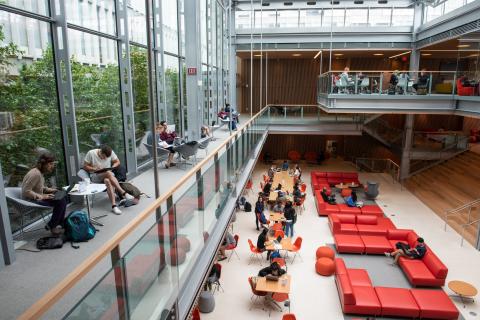
Health, Wellness, and Safety
The College's highest priority is maintaining the health, wellness, and safety of its students. For that reason, the College offers many different resources and support, both professional and peer support, in order to maintain community health and wellness.
If you are in need of support, there are many resources available to you. See below a list of some of the most commonly-abbreviated health resources, but also know that there are additional resources available to you on each of their respective websites.
Health, Wellness, and Safety
-
- CAMHS: Counseling and Mental Health Services
- CARE: Consent Advocates and Relationship Educators
- Contact: Peer counseling group specialized in topics of gender, sex, sexuality, and relationships
- ECHO: Eating Concerns Hotline and Outreach
- HealthPALs: Health Peer and Advisor Liaisons
- HUHS: Harvard University Health Services
- HUPD: Harvard University Police Department
- INDIGO: Peer counseling focused on how your race, class, citizenship status, sexuality, and any other identity affects your mental health
- Room 13: General concerns peer counseling
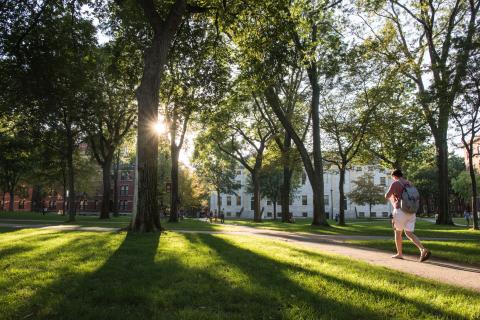
Campus Life
As you arrive on campus for your first year, you may have many questions. Who is a proctor? Is an entryway the same thing as a hall? What is FlyBy?
See below a list of terms that relate to Harvard's on-campus life, including terms related to the first-year residential experience.
Campus Life
-
- Brain Break: Late-night snack sessions hosted in Annenberg Hall and upper-level dining halls on weeknights and throughout Reading Period
- D-hall: Dining hall
- Entryway: A group of 20-40 students who share a floor or section within a dormitory
- FlyBy: An on-the-go, bagged meal dining service provided to Harvard students on weekdays
- HUDS: Harvard University Dining Services
- PAF: Peer Advising Fellow
- Proctor: Staff or graduate students who live in the dormitories and advise students on personal, residential, social, and academic matters. For some first-year students, Proctors also serve as academic advisers. Proctors oversee entryways of roughly 25 to 30 students, and, together with a small group of Peer Advising Fellows, foster community among students in the entryway. Read more about proctors.
- Resident Dean: Individuals who live on campus and oversee student academic, social, and extracurricular wellbeing
- RDF: Resident Dean of First-Year Students
- Tutor: An individual who works with, supports, and advises upper-level students in the Houses
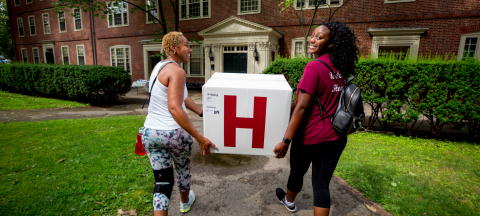
First-Year Programs
As incoming first-year students approach the beginning of their College experience, there are many pre-orientation programs available to them. These programs allow first-year students to meet other students, learn about the College, and ask any questions they may have before arriving on campus.
See below a list of acronyms for all of the pre-orientation programs offered to incoming first-year students.
First-Year Programs
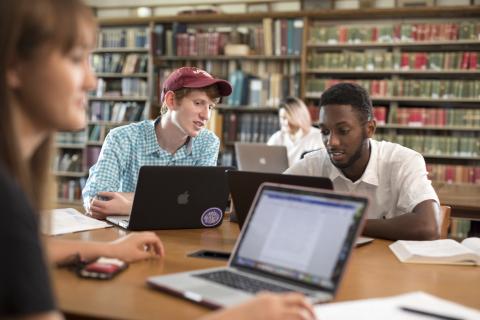
Resources
At Harvard, there are many resources available to help students in their academic, residential, social, and extracurricular endeavors. Though we encourage students to take advantage of these resources, we understand that it may be difficult to utilize these tools if a student does not recognize an acronym or abbreviation.
See below a list of terms, acronyms, and abbreviations relating to resources. These resources include library tools, financial resources, technological support, student events databases, academic office hour spaces, and more.
Resources
-
- Boardplus: A component of the undergraduate meal plan, designed to increase flexibility to that meal plan; students receive $65 of BoardPlus dollars per semester that can be spent at any HUDS-operated café, House grille, or for guest meals in the dining halls. Read more about Boardplus.
- BorrowDirect: A library service that allows students to borrow materials form partner institutions. Read more about BorrowDirect.
- Crimson Careers: An Mignone Center for Career Success (MCS) resource database for jobs and internships. Read more about Crimson Careers.
- Crimson Cash: A declining balance convenience account accessed through your Harvard ID card. Crimson Cash is an easy way to buy the things you need including at select off-campus merchants, on-campus retail and dining locations, vending machines, laundry, copying and printing. Read more about Crimson Cash.
- HarvardKey: Harvard University's unified online user credential, uniquely identifying students to Harvard IT applications and services to grant access to resources. Read more about Harvard Key.
- HOLLIS: Harvard Library catalog, see also Harvard Library.
- HUID: Harvard ID card, see also Campus Services
- HUIT: Harvard University Information Technology
- LRC: Language Resource Center
- MBTA (The T): Cambridge and Boston's public transportation system. Read more about the MBTA.
- MQC: Math Question Center
- PSN: Public Service Network
- The Shuttle: A Harvard shuttle service, with routes to the upper-level Houses and other campus locations. Read more about shuttle and van services, including the Evening Van Service and the Passio Go app.
- Student Organization Center Online (SOCO): A student activities platform that allows users to search for upcoming events, connect with groups, read the latest student group news, and access campus resources. Read more about SOCO.
- UDR: Harvard University Disability Resources
- Yard Ops: Maintenance, Room Keys, etc.
